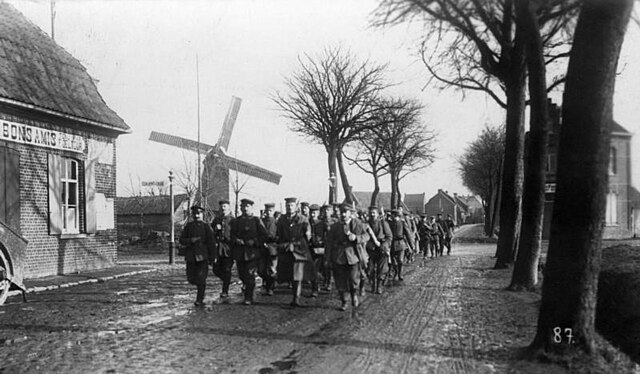Wervik is a city and municipality located in the Belgian province of West Flanders. The municipality comprises the city of Wervik and the town of Geluwe. On January 1, 2014, Wervik had a total population of 18,435. The total area is 43.61 km2 which gives a population density of 423 inhabitants per km2. The area is famous for its excellent tobacco and has a tobacco museum. The town is separated from its French counterpart Wervicq-Sud by the river Lys.
Wervik
Germans coming from Wervik marching to the front
Saint Medardus church
Low Countries theatre of the War of the First Coalition
The Low Countries theatre of the War of the First Coalition, in British historiography better known as the Flanders campaign, was a series of campaigns in the Low Countries conducted from 20 April 1792 to 7 June 1795 during the first years of the War of the First Coalition. As the French Revolution radicalised, the revolutionary National Convention and its predecessors broke the Catholic Church's power (1790), abolished the monarchy (1792) and even executed the deposed king Louis XVI of France (1793), vying to spread the Revolution beyond the new French Republic's borders, by violent means if necessary. The First Coalition, an alliance of reactionary states representing the Ancien Régime in Central and Western Europe – Habsburg Austria, Prussia, Great Britain, the Dutch Republic, Hanover and Hesse-Kassel – mobilised military forces along all the French frontiers, threatening to invade Revolutionary France and violently restore the monarchy. The subsequent combat operations along the French borders with the Low Countries and Germany became the primary theatre of the War of the First Coalition until March 1796, when Napoleon took over French command on the Italian front.

Prussian troops enter Amsterdam, 1787
York's attack on Valenciennes
Positions of the armies in early April 1794, at the start of the 1794 campaign First Coalition forces French Republic forces
Battle of Mouscron (29 April 1794), painted by Charles Louis Mozin (1839)







